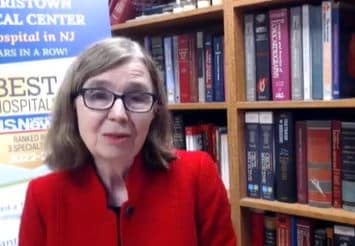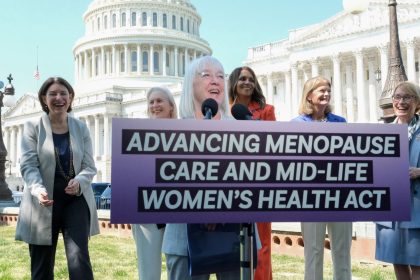Sherrill Hosts Facebook Live Session on Women and Heart Health

MORRISTOWN, N.J. — Rep. Mikie Sherrill, D-N.J., hosted a Facebook Live discussion this past week to discuss disparities in treatment and health outcomes for women suffering from cardiovascular disease and during cardiac events.
Joining Sherrill in conversation was Dr. Linda D. Gillam, chair of Cardiovascular Medicine at the Morristown Medical Center/Atlantic Health System.
And while they touched on a wide range of heart health-related topics, central to the discussion was Sherrill’s recently introduced Health Enhancement through Access to Research and Training Act.
The bill would establish a grant program enabling hospitals, community health centers, public health departments and medical and health professional schools to design accredited Continuing Medical Education programs specific to heart disease in women.
It has been referred to the House Committee on Energy and Commerce, though no action has been taken on it as of yet.
Gillam said the need for such programs is very real. Despite the fact that women make up the majority of the population, they are still considered an underserved minority when it comes to health care, she said.
That prompted Sherrill to recall a conversation she’d had with another doctor, who explained to her the difference in the first signs of a heart attack in a man and a woman.
“He said, ‘When it comes to men, we sort of know what the onset of a heart attack looks like — there’s the tingling in the left arm or pain in the chest,’” Sherrill remembered. “Then he said, ‘Do you know what the first sign of a heart attack is in a woman? Sudden death.’
“Which is really just horrible,” the congresswoman said. “I mean, it’s horrible that we know so little sometimes … that we as a public are so ill informed.”

Gillam tried to be reassuring.
“Some of the symptoms are similar,” she said. “One of these is shortness of breath, which is a symptom of many forms of heart disease. Women get short of breath the same way that men do.
“That said, there are some differences,” Gillam continued. “One thing that’s clear to medical professionals, for instance, is that women tend to downplay their symptoms. They tend to say, ‘Oh, I’ve got to get my kids from school or I’ve got to do this or I’ve got to do that.’
“So women tend not to pay attention when their bodies are giving them these warning signs that a heart attack is imminent,” she said. “So, in the case of a classic heart attack symptom — that feeling that people describe as being like having an elephant on their chest. Women get that symptom too.
“But their chest discomfort can sometimes mimic [acid reflux] burning, so they dismiss it as simple heartburn,” she added.
Gillam said one “interesting presentation” for heart attack in women is that the attack itself is often preceded by an overwhelming sense of fatigue in the days leading up to it.
“During this time they can have other GI symptoms as well, including nausea. So what I always advise women is pay attention to these symptoms. Please don’t ignore them,” she said.
Both women agreed heart health begins with having a sense of one’s own body and that it changes over time.
Sherrill illustrated this point by pointing to a small sling she’s currently wearing.
“I hyper-extended my elbow … and the sling is really embarrassing because people keep asking me, ‘What’s wrong?’” she laughed. “And all I can say is, ‘I’m not 20. I can’t handle things like I used to … when I was in my 20s, aches and pains just kind of magically disappeared. That no longer works!”
Turning serious again, Sherrill then referenced a 2022 report from the American Heart Association, a study that found only 22% of physicians and 42% of cardiologists said that they felt prepared to adequately assess heart disease specific to women.
The AHA also reported that women who visited emergency departments with chest pain waited 29% longer than men to be evaluated for possible heart attacks.
The same report found that women of color waited on average 15 minutes longer for an initial evaluation by a provider when presenting with chest pain.
“We can joke about how as women we don’t come forward for every little ache or pain, or comment on how we all feel we’re so busy, but a study like this makes it seem that even when women do come forward, their concerns aren’t being taken as seriously,” Sherrill said. “Why is this so often the case?”
“I think the overarching issue is an inadequate fund of knowledge,” Gillam said. “Even now, after decades of the American Heart Association and the National Institutes of Health pushing out this message that heart disease is the most common cause of death in women — as it is for men — women frequently still view their risk of dying from something like breast cancer as being more significant.
“At the same time, when it comes to people who are health care providers, they just aren’t as well educated about the ways in which heart disease presents itself in women as they are when it comes to men. They’re just not as tuned in, in regard to the differences in the risk profile for women versus men. And that’s why the legislation you’re sponsoring is so critically important.
“The other piece of this, which you mentioned, is the disparity in care,” Gillam continued. “It is true that when people come to an emergency room in this country, a White woman is less likely to be triaged as if they’re having a heart attack as a White man is … and, I would say, Black and Hispanic women are treated less effectively than White women. And that’s really a reflection of the overall disparities we see in health care.
“And sadly, when you do the arithmetic, you would rightly conclude that Black women, Hispanic women, are likely to be disadvantaged both in terms of their access to health care and in the treatment they receive when they do get access,” she said.
“So what are medical professionals doing to address these issues?” Sherrill asked.
“I’m really proud to say that our big professional organizations, the American College of Cardiology and the American Heart Association, have identified health care inequity as the most important issue that has to be tackled,” Gillam said.
Inequity occurs for a number of reasons. Sex and gender are critical factors. So is race, age … socio-economic status … and simply having a patient speak a language other than English,” she continued.
“Thankfully, our professional organizations have recognized this and are taking a multi-pronged approach to addressing all of these factors. And a big part of this is education. Another big part of this is making sure that the research studies we conduct don’t just include White men, but better reflect the population as a whole,” Gillam said.
“That’s really becoming a priority with the funding agencies and it’s really becoming a priority for the journals that publish the results of the research. So there’s a lot going on to address these disparities.”
Sherrill said the HEART Act should help.
It was based in part on her own experience as a lawyer who regularly participated in continuing legal education.
Gillam said if it advances and ultimately gets signed into law, Sherrill’s bill would have an “enormous” impact on the profession, generally, and heart health care for women, specifically.
“The reason is, medicine changes. It certainly changes over the course of a professional lifetime, but it also changes from month to month and year to year,” she said. “CME is required for licensure here in New Jersey, as well as in other states. It is also required for credentialing at individual hospitals, including all the hospitals in the Atlantic Health System.”
“So what should CME tackle?” Sherrill asked.
“When it comes to CME I think common sense suggests it should really be focused on the areas where we know there is the largest knowledge gap,” Gillam said. “And when I refer to the size of a knowledge gap, I’m talking not just about how deficient we are in terms of the knowledge in some areas, but also the number of people potentially affected by this deficiency.
“Heart disease in women checks all the boxes. So it’s a very, very important problem. And that’s why a CME focused on this particular area is critically important,” she said.
Dan can be reached at [email protected] and at https://twitter.com/DanMcCue
























